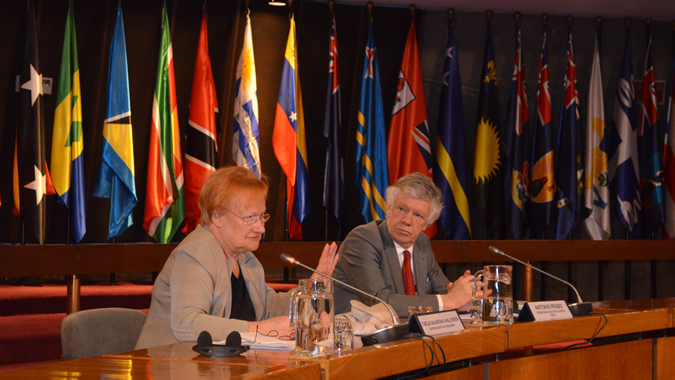Tarja Halonen Will Address at ECLAC the Social Dimension of the 2030 Agenda for Sustainable Development
The former President of Finland will give a keynote lecture on Tuesday, September 12 at the UN regional organization’s central headquarters, where she will be received by the Executive Secretary, José Manuel Salazar-Xirinachs.

The former President of Finland, Tarja Halonen, will deliver a keynote lecture on Tuesday, September 12 at the central headquarters of the Economic Commission for Latin America and the Caribbean (ECLAC), in Santiago, Chile, where she will be received by the United Nations regional organization’s Executive Secretary, José Manuel Salazar-Xirinachs.
The Finnish lawyer and politician, who became the first woman to serve as President of her country on March 1, 2000, will give a lecture entitled “The Social Dimension of the 2030 Agenda - the global challenge ahead,” at 11 a.m. local time in Chile (UTC/GMT -3).
The keynote lecture will be inaugurated by José Manuel Salazar-Xirinachs, ECLAC’s Executive Secretary, and will feature opening remarks by Juan Somavía, President of Chile’s Permanent Forum on Foreign Policy, and Johanna Kotkajärvi, Ambassador of Finland in Chile.
Tarja Halonen was born in Kallio, a traditionally working-class neighborhood in the Finnish city of Helsinki. In 1970, she began working as a lawyer for the Central Organization of Finnish Trade Unions (SAK) and between 1974 and 1975 she served as parliamentary secretary to the Prime Minister of Finland, Kalevi Sorsa. From 1977 to 1996, she was a member of the Helsinki City Council, and in 1979 she was elected to Parliament for the first time.
From 1987 to 1990 she served as Minister of Social Affairs and Health, and in 1989 she also began serving as Minister responsible for Nordic cooperation. She was the Minister of Justice in 1990-1991, and also served as Minister of Foreign Affairs, a position she held until she was elected President of Finland.
Halonen took office as president on March 1, 2000 for a six-year term, during which her public approval ratings reached 88%, which led to her being re-elected in 2006.
During her presidency, she served as co-chair of the International Labour Organization’s (ILO) World Commission on the Social Dimension of Globalisation, and was a member of the Group of Eminent Persons of the United Nations Conference on Trade and Development. She also co-chaired the United Nations Millennium Summit in 2000, along with Sam Nujoma, former President of Namibia.
As president of Finland, she paid special attention to human rights, democracy, gender affairs and education. The Finnish educational model is considered to be a global example: thanks to the priority given to education, the country was able to make the leap from being a commodities exporter to a manufacturer of high-tech products. Tarja Halonen has said that this was achieved thanks to investment in “education, education, education.”
Furthermore, Finland was the first country in the world to give women the right to vote and have them present their candidacies (in 1906), and it currently ranks third (behind only Iceland and Norway) on gender equality, according to the World Economic Forum’s Global Gender Gap Report 2023.
Members of the media are invited to attend this keynote lecture, which will be held in the Raúl Prebisch conference room at ECLAC’s headquarters (Av. Dag Hammarskjöld 3477, Vitacura, Santiago, Chile). Journalists must have their media credentials or IDs with them to gain entry and must get accredited in advance by sending an email to prensa@cepal.org.
The lecture will also be transmitted online via the website live.cepal.org/conferenciamagistral and the United Nations regional commission’s accounts on Twitter (@cepal_onu) and Facebook (https://www.facebook.com/cepal.onu).
What: Keynote lecture by Tarja Halonen, former President of Finland.
Who:
- Tarja Halonen, former President of Finland
- José Manuel Salazar-Xirinachs, ECLAC’s Executive Secretary
- Juan Somavía, President of Chile’s Permanent Forum on Foreign Policy
- Johanna Kotkajärvi, Ambassador of Finland in Chile
When: Tuesday, September 12, 2023, 11:00 a.m. local time in Chile (UTC/GMT -03:00).
Where: ECLAC’s headquarters, Santiago, Chile (Av. Dag Hammarskjöld 3477, Vitacura). Raúl Prebisch conference room.
Virtual transmission via live.cepal.org/conferenciamagistral and ECLAC’s accounts on Twitter (@cepal_onu) and Facebook (https://www.facebook.com/cepal.onu).
Related content

Tarja Halonen: Implementación de agenda de género es la base para alcanzar el desarrollo sostenible
La ex Presidenta de Finlandia dictó una conferencia magistral en la CEPAL, donde fue recibida por el Secretario Ejecutivo Adjunto del organismo regional, Antonio Prado.
Type
Country(ies)
- Latin America and the Caribbean
-
Finland